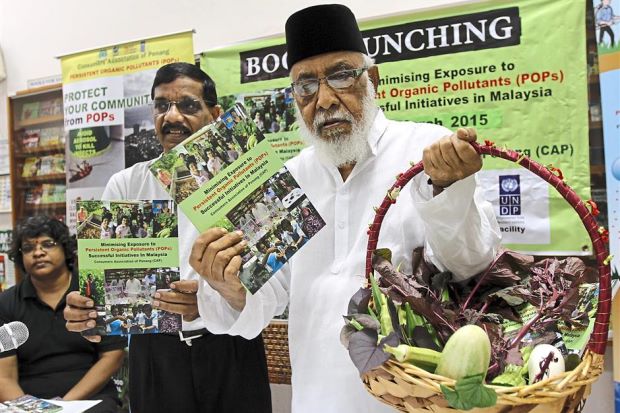Consumers Association of Penang featured in The Star article about POPs
http://www.thestar.com.my/Metro/Community/2015/03/11/Healthy-and-bountif...
FARMING without using agrochemicals has proven to be healthier and more profitable.
Betel leaf farmer from Sungai Petani N. Palaniappan, 46, said opting for natural farming was the best decision he made.
“As I had very little knowledge about natural farming, I had to use agrochemicals for my plants.
“At times, I do try to use natural farming methods which I picked up from television programmes or the newspapers. But, I’m now fully into natural farming with the knowledge I have gained from the Consumers Association of Penang (CAP),” he said.
Palaniappan is among the farmers who have experienced the benefits of natural farming, who are featured in CAP’s book ‘Minimising Exposure to Persistent Organic Pollutants (POPs): Successful Initiatives in Malaysia’, which was recently launched at the CAP office in Jalan Masjid Negeri, Penang.
Palaniappan, who has 15 years of experience as a farmer, said his 2,000 betel plants are heathier after opting for natural farming.
“Each plant is producing more leaves and they are not wilting like before.
“The sore throat and eye irritation problems that I used to experience when using pesticides and chemical fertilisers have also stopped,” he said.
Vegetable farmer Loi Mei Shy, who graduated from Universiti Sains Malaysia (USM), said she was getting better vegetables now with the help of natural farming.
The 31-year-old, who grows corn, brinjal and a variety of herbs, said pests and fungus were a huge problem at her farm.
“With natural farming, these problems have been reduced and I’m still learning to control them through the methods taught by CAP.
“We need to educate the younger generation to lead a toxic free life,” she added.
The 108-page book contains detailed case studies of successful farmers who have switched to natural farming, as well as tips and techniques of farming.
CAP president S.M. Mohamed Idris explained that POPs are a group of hazardous chemical pollutants that persist in our environment for a prolonged period as well as leave its negative impact on the environment and human beings.
“Excessive use of pesticides, weed killers and other forms of chemicals in Malaysian farms proves that each Malaysian gets a share of these dangerous pollutants through the food they consume and the air they breathe in,” he said.
He added that the rapid increase in chronic diseases among Malaysians was a strong evidence.
Mohamed Idris said that to overcome this problem, CAP made the effort to educate farmers who were using agrochemicals at their farms to switch to natural farming methods.
He added that the group hopes the Federal Government would ratify the Stockholm Convention on POPs that aims to restrict and finally eliminate the production, use, release and storage of the hazardous stuff.
----------
See the publication "Minimising Exposure to POPs: Succesful Inititaives in Malaysia" here.

